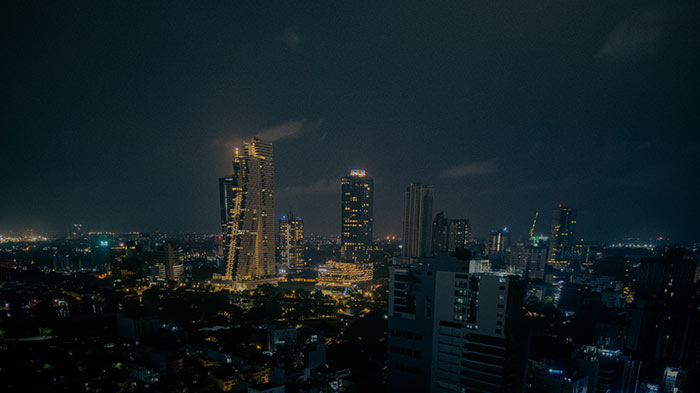Analysis: A year later, Sri Lanka’s tentative economic recovery eludes the poor

An evening view of the main buildings and towers of the city at Colombo, Sri Lanka, on March 21, 2023. (Photo by Thilina Kaluthotage / NurPhoto via Getty Images)
A year after angry Sri Lankans stormed the president’s residence and forced his ouster during a meltdown of the economy, the island’s streets are calm, there are no serpentine queues at fuel stations and hours-long power cuts have ended.
The central bank expects the economy to resume growth this quarter after six quarters of contraction – faster than expected by many economists – while overseas remittances are surging and tourist numbers are rising.
While economists judge the country to be past the worst of the crisis, it’s problems are far from fixed. Food, healthcare and house rental costs are high and still increasing, the poverty rate has doubled in the last year and is seen rising further, while negotiations to reorganise the government’s crippling debt burden face some uncertainty.
“Stability is somewhat there but what it means is no extreme shortages, no fuel queues, and no 13-hour power cuts,” said Rehana Thowfeek, an economist at the Colombo-based Advocata Institute think tank.
“Inflation is tapering off but compared to pre-crisis levels, the cost of living is very high and incomes have not kept up. The bulk of Sri Lanka’s poor people are daily wage earners, and they are among the hardest hit.”
Sri Lanka sank into a financial crisis after the COVID-19 pandemic decimated tourism and remittances from citizens working abroad fell. The war in Ukraine pushed prices for imports, particularly fuel, sharply higher.
In March last year, thousands took to the streets to vent their anger at lengthy power cuts and spiralling prices, and to call for the Rajapaksa family that had dominated the country’s politics for much of the last 20 years to leave power.
After weeks of protests and a steady worsening of the crisis, President Gotabaya Rajapaksa fled overseas, formally stepping down on July 13. He was replaced as president by his prime minister, Ranil Wickremesinghe, who brought in reforms and negotiated a $2.9 billion bailout from the International Monetary Fund (IMF) in March.
While price increases are easing, they are still high. Power costs, which jumped 65% in February, remain difficult for low-income families despite a 14.2% reduction in July.
The key inflation index was at 12% in June and is expected to hit single digits in July after peaking at 70% in September and following a rebasing in February. But food, clothing, health care and housing costs remain elevated.
Food inflation hit a record high of 95% in September and although it has come down, June’s reading of 4.1% means prices are still rising. Clothing prices increased 44% on the year in June, housing 26% and medical 16%.
Rising costs are having a toll on poverty, which nearly doubled to 25% of the population last year and could jump to 27.4% this year, according to the World Bank. Last week, the multilateral lender to developing countries approved a $700 million loan for Sri Lanka, including $200 million for the poor.
Lots to do
In a new initiative to help the poor, the government has said it will roll out a direct cash transfer programme to about 2.3 million families later this month and pledged to spend $680 million a year on their welfare. But critics say the monthly handout of 2,500 rupees ($8) to 15,000 rupees, based on poverty levels, is inadequate.
Kamal Padmasiri, a board member of the state-run Welfare Benefits Board, estimated the requirement at 13,800 rupees per person per month but said the exchequer cannot pay the whole amount.
“We are in a default situation in Sri Lanka,” Padmasiri told Reuters. “Cash transfers will be given for three years and people need to develop and move forward during this time. The payments are not permanent … we cannot afford it.”
There have been some gains however.
A 30% rise in tourism revenues this year and a 76% jump in remittances have funnelled $3.2 billion into Sri Lanka’s coffers, helping reserves hit a 14-month high of $3.5 billion in May, and the currency appreciate by about 18% this year.
Sri Lanka still must rework a large chunk of its $36 billion foreign debt, which includes $12.5 billion in international sovereign bonds and $11.3 billion bilateral credit owed mostly to China, Japan and India.
Wickremesinghe has set a goal of finalising debt talks by September, which, if successful, would smoothen the release of a second tranche of IMF funding due by October.
But China, Sri Lanka’s largest bilateral lender with about $7.4 billion in outstanding bilateral and commercial loans, has so far declined to join a so-called common framework led by Japan and the Paris Club to renegotiate Sri Lanka’s debt. read more
Also, despite the projection of growth starting in the July quarter, Sri Lanka’s export-driven economy is expected to contract by 2% in the full year, after shrinking 7.8% in 2022. Exports fell 11% this year until May, mostly driven by a 16.5% drop in garment sales to the European Union and the United States.
“We really need our exports to accelerate, we need genuine investors coming in, and we need to take forward market access through free-trade agreements and other measures,” said Shiran Fernando, chief economist at Sri Lanka’s largest industry body Ceylon Chamber of Commerce.
“The IMF programme will only keep us going for the next one-to-two years but beyond that we need stronger reforms around land, labour and loss-making state enterprises.”
($1 = 307.5000 Sri Lankan rupees)
(Reuters)
The post Analysis: A year later, Sri Lanka’s tentative economic recovery eludes the poor appeared first on ONLANKA - Sri Lanka Latest Breaking News and Top Stories.



